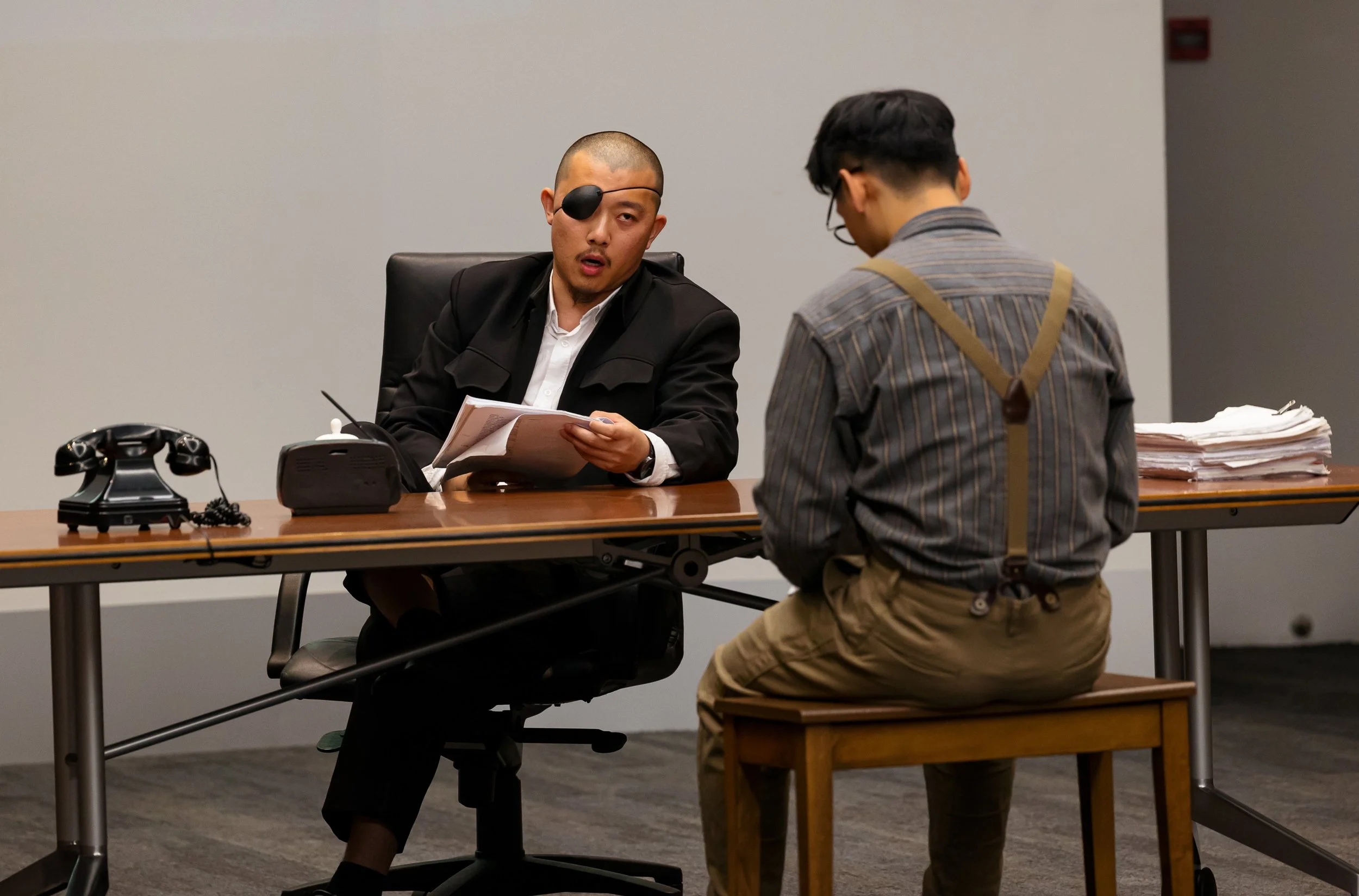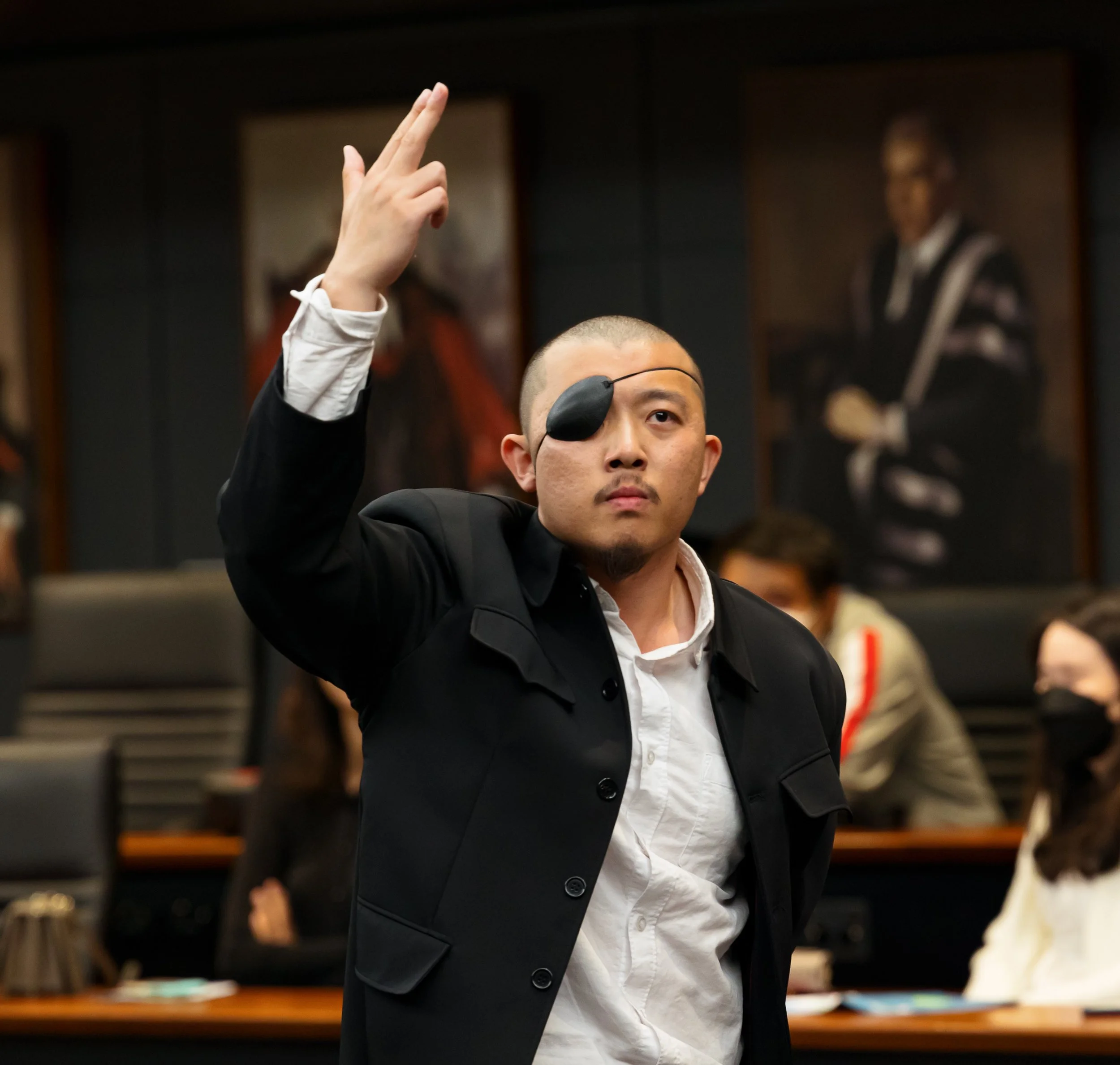Review: Last Laugh
Picture (L to R): The ‘Censor’ (Fengyi [Fini] Liu) at work with The ‘Playwright’ (Hanwen [Michael] Zhang) . Picture credit: Creative Futures Photography.
As I write this review, the 2022 Anywhere Festival run of this show is already over. Which is a tragedy, as I can certainly recommend Last Laugh as a thought-provoking work showcasing two talented actors (Fengyi [Fini] Liu and Hanwen [Michael] Zhang).
Set in 1942, the 90-minute show is set in the Censor’s office. The ‘Playwright’ (Hanwen [Michael] Zhang) visits the ‘Censor’ (Fengyi [Fini] Liu) to seek approval for the latest script to be performed by a local theatre company (‘The Last Laugh Troupe’). The challenge for the Playwright is that this new Censor does not appear to like or understand comedy, and is not planning to approve a parody of Romeo and Juliet. Fresh from duties as a soldier (and wearing an eyepatch following a bayonet wound to one eye), the Censor is not minded to “turn a blind eye” to any transgressions of the rules.
The piece is split into eight acts or days, with almost ‘full black’ (switching off of the lights) signifying the end of each ‘day.’ Over the course of seven days, the script is dissected, re-written, tested, and improved. And over that same week, the relationship between the two characters evolves—as the Censor moves from critic to co-writer, pupil, performer, and even a mentor. By the end of the week, the Playwright learns from the criticism, and considers that the work is greatly-improved by their work together. The Censor also appears to have learned from the experience—understanding the nature of humour and demonstrating a new enthusiasm for the theatre.
Promoted as an adaptation of Japanese screenwriter and director Yuki Mitani’s work “The University of Laughs.” Last Laugh found a suitable performance space in The University of Queensland Senate Room. The room provided a central performance space ‘in the round’ (well, oval really) with extremely comfortable seating and excellent views for the audience. It was easy to read the bilingual surtitles and to enjoy the unfolding drama.
I was not familiar with Mitani’s work prior to seeing Last Laugh, but from a quick review it appears that the original 1996 play was also developed as a 2004 film, before a 2007 English language run (as an adaptation by Richard Harris). Tasmania’s ENE World/Do Theatre production is mainly in Chinese (with some spoken English), and I assume it is a translation of the Richard Harris adaptation.
The ‘last laugh’ is colloquially used to refer to triumph or ultimate success. Last Laugh was an entertaining 90-minute show, and I particularly loved the Sixth Day, with the enthusiastic performance of the developing work by the Playwright and Censor. On the Seventh Day, they considers that the final revised script is a success, and the Censor confirms it will be approved—but the Playwright’s news and call-up papers switch the mood from triumph to despair.
Picture: The ‘Censor’ (Fengyi [Fini] Liu), pondering what is funny (Credit: Creative Futures Photography).
Picture: The ‘Playwright’ (Hanwen [Michael] Zhang), Credit: Creative Futures Photography..
Last Laugh is a thought-provoking work of contrasts and questions. The desire to understand quite what makes people laugh is a key theme—starting with the Censor struggling to understand comedy (the lovely pondering, when going off to use the bathroom). By the time of the Sixth Act instruction for the Playwright to write a comedy that does not make people laugh (the Playwright muses that “a comedy without laughs sounds interesting”), the show proves that dissecting humour is in itself funny.
Picture (L to R): The ‘Playwright’ (Hanwen [Michael] Zhang) and the ‘Censor’ ((Fengyi [Fini] Liu), Act Six (picture credit: Creative Futures Photography).
The evolving friendship or partnership between the two apparent ‘opposites’ (a playwright and a censor/former solider), and the gradual switching of their positions—quite literally as the Playwright sits in the Censor’s chair, and also as the Censor becomes playwright and the Playwright is about to become a soldier—are fascinating. We begin to ask who really is the playwright, and who is the soldier, and to reflect on the difficulty in understanding individuals as two-dimensional as their titles/roles. Stereotypes are certainly challenged, as we learn of the violence meted out by the actors, and hear of the tender advice from the former soldier to the Playwright. And by locating the play at the heart of The University of Queensland, the ENE World/Do theatre team encourage us to consider the different places and moments of learning in our lives.
The Final Act, set in Australia in 2022, leaves audiences questioning whether what we have just experienced is fact or fiction. And the audience and critics are left to consider the relationships between directors and writers, and between producers and critics—and the extent to which such interactions can further improve productions.
Congratulations to the ENE World/Do theatre team (including Sally Chen, Producer, and Fini Liu, Director and Censor). As a reviewer, I have limited advice as to how to improve on this production. This is a show that is well-cast, and the use of the surtitles makes it accessible to those of us who are not bilingual (perhaps consider how to make it full-accessible for the visually impaired/those unable to read the titles). A smaller space or larger audience would certainly have added to the laughter in the room, but this is a production that will work well in most venues. So my final advice is to consider promoting Last Laugh as an accessible, cross-cultural and thought-provoking show.
Verdict: Thought-provoking drama, ideally placed in The University of Queensland Senate Room.
Picture: The ‘Censor’ (Fengyi [Fini] Liu), pictured in The University of Queensland Senate Room (Credit: Creative Futures Photography).
Audience information: Some coarse language. The Last Laugh (only four Anywhere Festival performances, 5-7 May, 2022), at The University of Queensland Senate Room, St Lucia , QLD 4072. Tickets $30. 90 minutes.
The reviewer attended the Saturday 7 May (2:30pm) performance.
All pictures credit: Creative Futures Photography. A copy of this review first appeared at the Anywhere Festival website.





